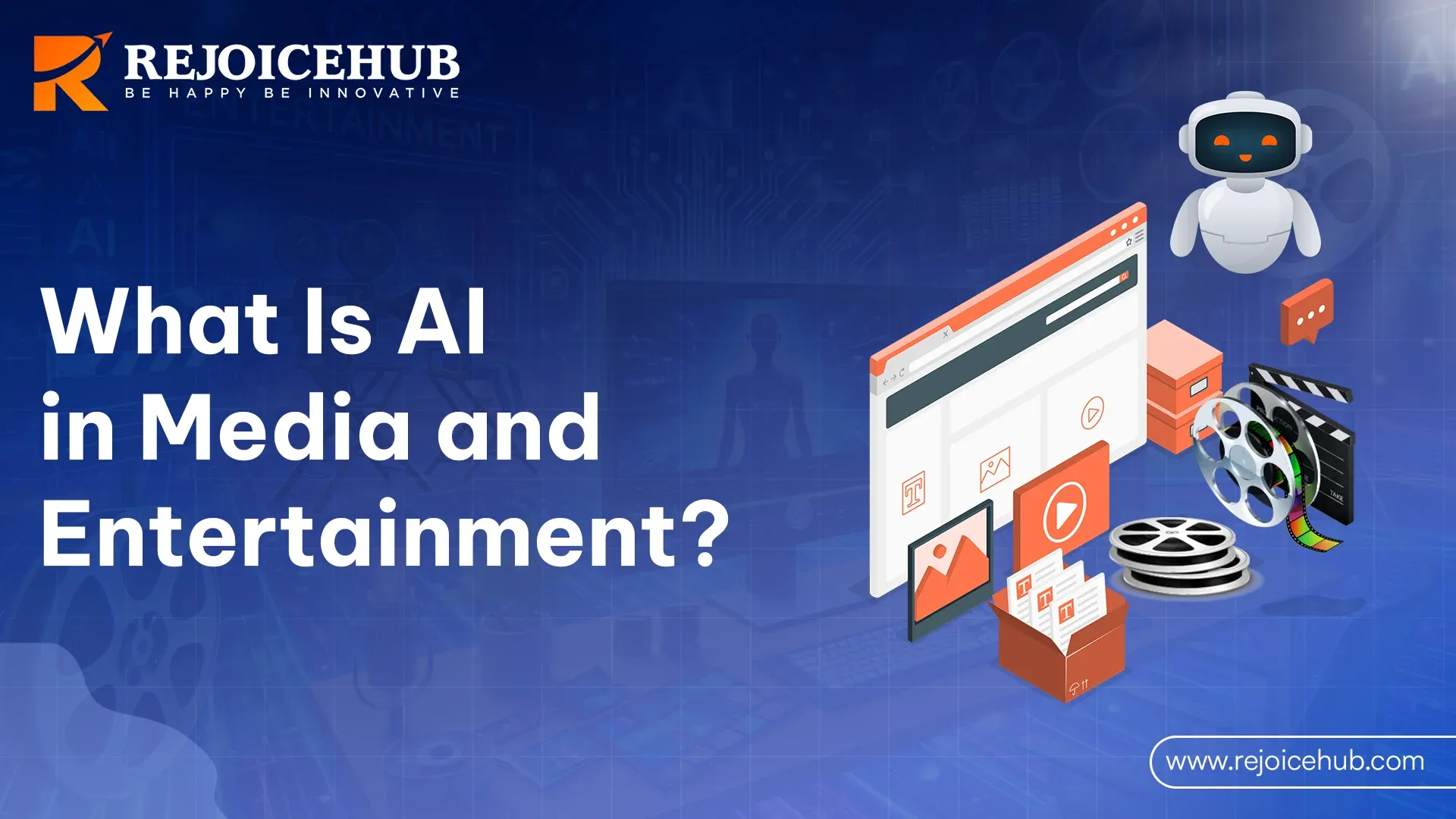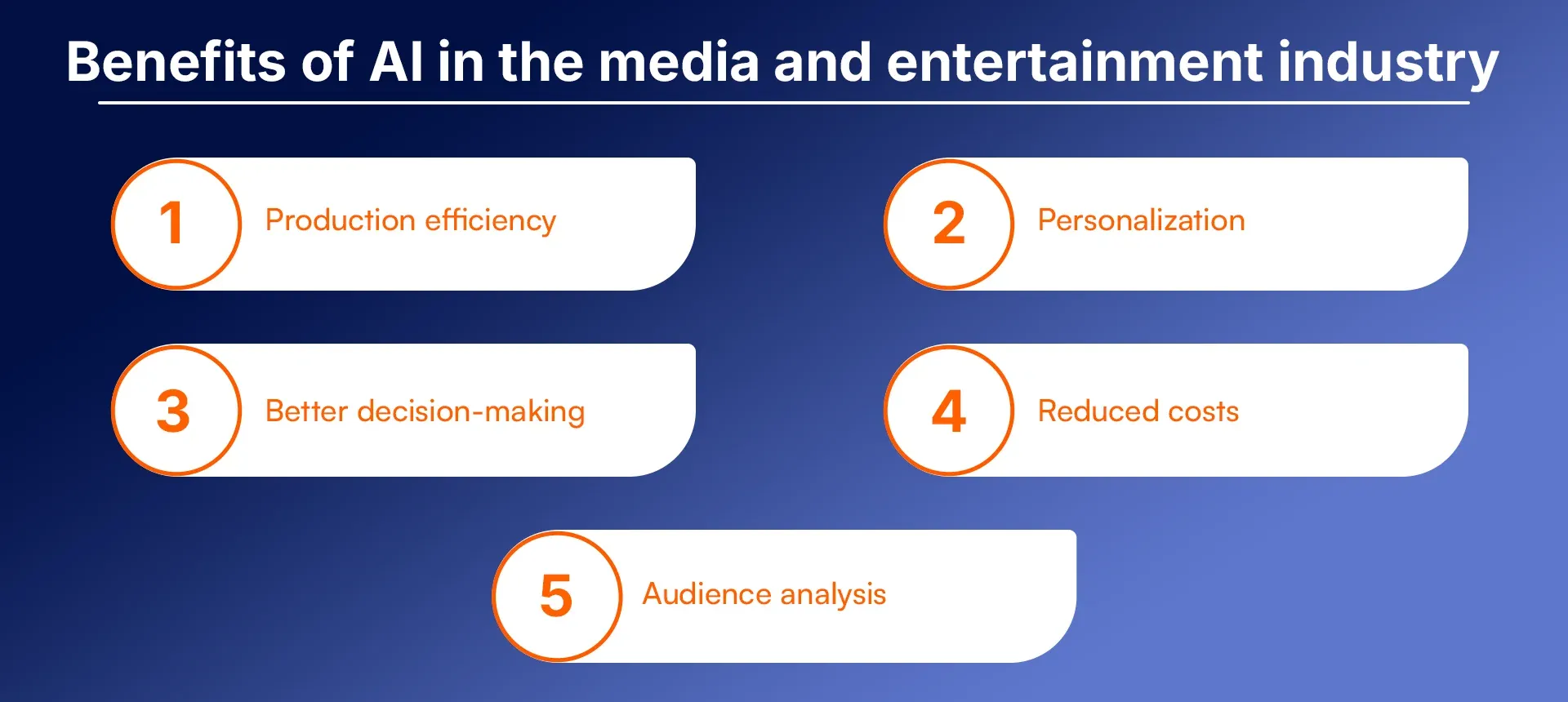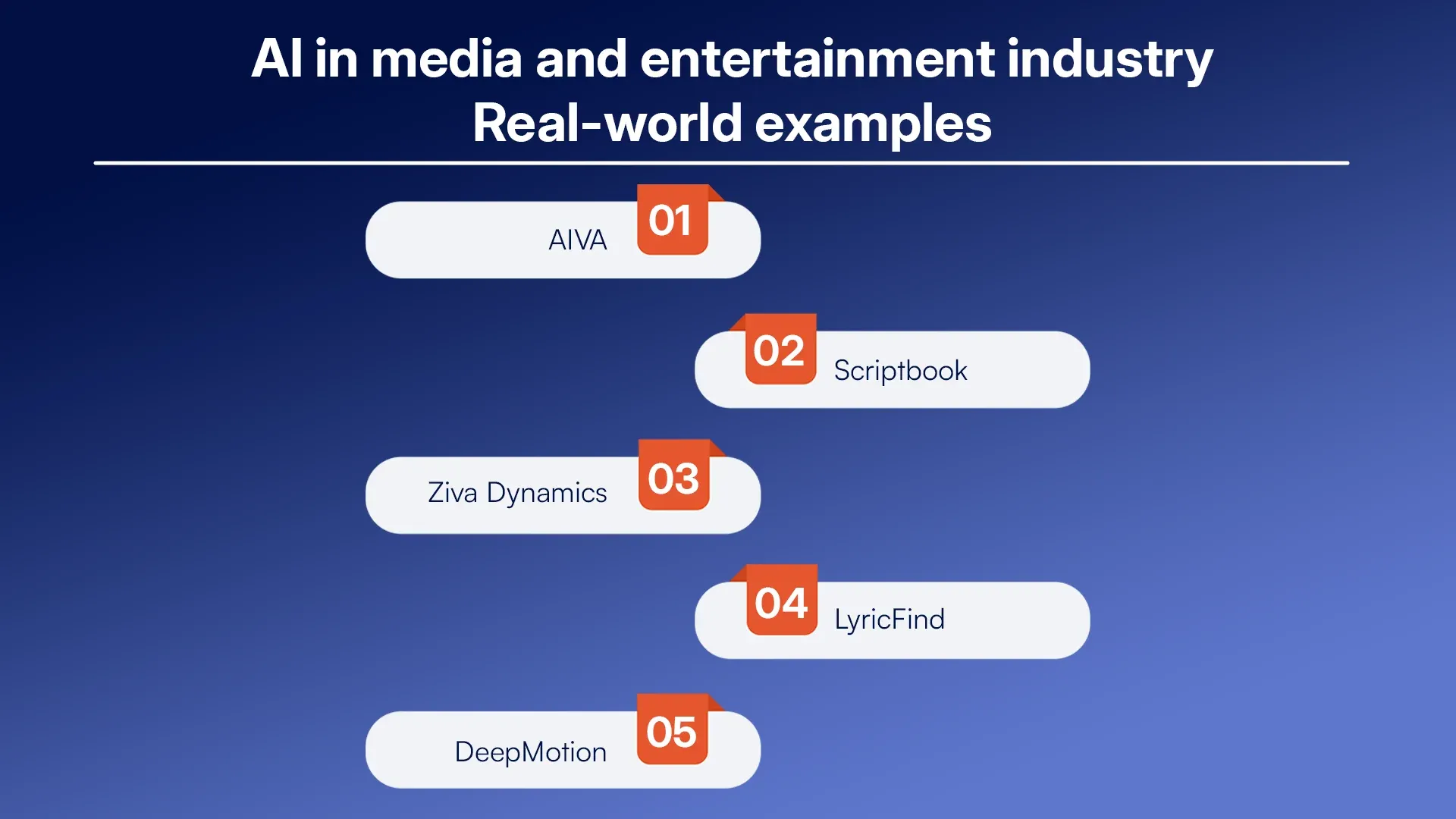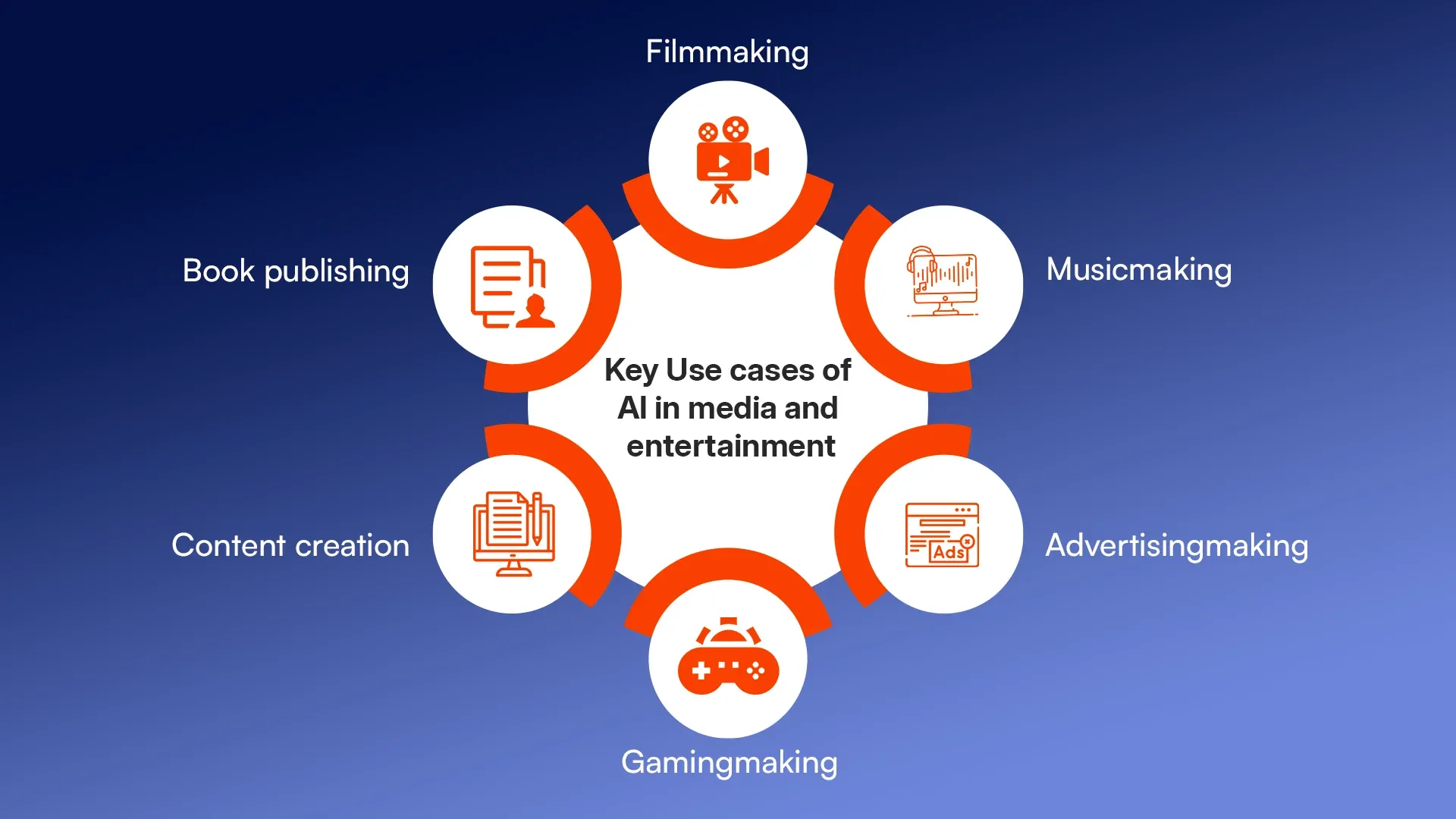
Just imagine that you are watching a movie which is perfect for your taste, or you are listening to a song which is specially created by artificial intelligence according to your mood. It sounds quite interesting to listen to, but it is quite possible in today's time. In today's fast-evolving world, where artificial intelligence is evolving so much, it is impacting every sector from consumer to producer on a daily basis. And artificial intelligence is also impacting the entertainment and media sector, due to which the way we create and interact with consuming content is changing a lot.
Artificial intelligence has become so powerful today that a Kannada director Narasimha Murthy, produced and released a complete movie named “Love You” completely using AI, in which not even a single human actor was used, but still a lot of people liked the movie.
AI can generate everything from personalized content to AI-generated scripts and media today, so let’s find out how AI will impact the Entertainment and media industry and what its current use cases and trends are going on.
Quick Summary
It is not that the use of advanced technology or software was not there in the entertainment and media industry earlier, rather the use of advanced software like VFX has been happening since quite a long time but AI tools and software have brought a lot of changes in the media and entertainment industry and the main reason for this is that AI generates content quite easily and creates such visuals on its own which would have cost a lot of money to shoot, due to this reason also the film producers are giving a lot of priority to AI usage for cutting the cost, and it is a simple thing that when the content is produced by AI then it will also have an impact on the taste of the people who consume it.
Another big positive point of AI is that it enhances the user experience further and also simplifies the content production processes, thereby saving a lot of operational costs.
AI is currently being used a lot for filmmaking, music, advertising, gaming, content creation, and publishing purposes.
What is AI in Media and Entertainment?
In media and entertainment, AI is a type of application that uses machine learning algorithms and artificial intelligence technologies to create, personalize, and optimize content. Be it video, music, games, or written content, AI uses its vast datasets to produce it. Apart from this, AI is used for many tasks in the Media and Entertainment industry, which includes automating basic tasks like scriptwriting, editing, voiceovers, audience analysis, content recommendations and advanced AI can even predict box office performance.
For example, platforms like Netflix, Spotify or even YouTube use AI-driven recommendation systems so that they can analyse your content taste and suggest you the best content, that is why you might have noticed many times that you might have opened these platforms only to watch some content or music but their suggestions are so perfect that you end up consuming a lot of content, the main reason for so much addiction of content consumption is also these AI driven systems and algorithms.
The Impact of AI in Media and Entertainment
AI was started as a simple and supportive tool but today it has become the central point of media innovation, using which producers can test their scripts and ideas through AI media, thereby saving a lot of time apart from operational costs.
AI has revolutionized content production and distribution to a great extent, and it has also changed the taste of the content consumers a lot, as it tries to personalize the user experience a lot, due to which maximum audience likes that content, and a lot of cost saving can also be done by automating repetitive and complex tasks. Because of all this automation, businesses have detailed business analytics and their performance data, based on which they can take data-backed decisions.
Today's streaming giants like Amazon Prime and YouTube are so popular today due to the power of AI, because if the user behavior and content recommendation algorithms of the platform are weak, then they will never be able to grow, as maximum users get to explore the creator or video according to their taste for the first time through that platform only. Because there are many people who consume the recommended content on the platform rather than doing a manual search. And today, most of the media companies use AI to improve social media sentiment, content optimization and ad placements.
Benefits of AI in the Media and Entertainment Industry
Actually, AI has a lot of benefits for the Media and Entertainment industry, which we already know a lot about, but let’s try to understand it in a little more detail.

1. Production Efficiency
The best benefit of AI tools is that they can automate time-consuming tasks like video editing, audio mastering, animation rendering, and visual effects generation to a great extent. This shortens the production cycle, which saves production costs and also reduces the chances of human error, allowing creators to focus on storytelling.
2. Personalization
After analyzing user data, AI tools give content recommendations based on the taste of the AI user. Whether it is suggesting the next content to the user or creating personalized auto-generating playlists, AI algorithms play a very important role in driving content. AI algorithms enhance user satisfaction and engagement.
3. Better Decision-Making
AI systems significantly increase predictive analytics, sentiment analysis, and market trend forecasting capabilities and are also much faster than human analysis. These insights help media executives and producers make informed decisions about content development and marketing strategies. It is quite easy to find out and make better decisions using AI tools on which scripts a movie should be made or not.
4. Reduced Costs
As we already know, it can do many of these tasks automatically, which saves a lot of cost because it can generate everything from script writing to expensive scenes, which saves a lot of operational costs and employee costs. This eliminates the need for large production teams and optimizes resources to a great extent.
5. Audience Analysis
AI works on data driven analysis, which allows it to easily identify your behavior patterns and this data makes it easier for companies to understand audience segments so that they can deliver personalized content to you, so that you spend more time on the platform, and companies can earn more profit. This allows companies to create effective content strategies that can help them get higher engagement rates.
Also Read: AI in Gaming Industry: Use Cases, Benefits, and More
AI in Media and Entertainment Industry: Real-World Examples
Let us understand with real world examples which AI tools are being used in the Media and Entertainment Industry and for what purpose.

1. AIVA
AIVA (Artificial Intelligence Virtual Artist) company composes original music by analyzing the user's mood, genre, and user input. It’s used in films, games, and ads to generate soundtracks perfect to the emotional tone.
2. ScriptBook
It is used by film studios, basically ScriptBook analyzes screenplays and predicts how much success a movie can achieve, for this they consider movie’s theme, characters and storyline structures and analyze historical data, releasing dates and many patterns.
3. Ziva Dynamics
Ziva Dynamics creates hyper-realistic 3D character models for films and games using AI that simulates artificial muscle and skin movements. Ziva Dynamics designed high-quality 3D character models in Hollywood movies like The Garfield Movie, Dune: Part Two, and Godzilla x Kong: The New Empire, which were well praised by the audience.
4. LyricFind
This AI tool uses natural language processing to help users find lyrics quickly and accurately. It supports voice commands and understands natural queries. Platforms like YouTube Music or Spotify also use LyricFind as a source for the lyrics of any music, so we can understand its accuracy and credibility.
5. DeepMotion
Deep motion gives life to paper or virtual characters and uses high-end animation to give them motion, which is later used in a media format. It simulates real human movement, reducing the need for manual keyframing.
Key Use Cases of AI in Media and Entertainment
Let's learn about the use of AI in Media and Entertainment so that we get an idea of how much control AI has taken over the media industry.

1. In Filmmaking
Filmmaking follows a lot of operational processes which include a lot of things from writing to distribution. Let's know how AI platforms are used in filmmaking.
-
Assisting with Pre-production: AI tools help directors in creating a scene or identifying the best location, and also what will be the best time and logistics for shooting.
-
Writing Scripts: In filmmaking, tools like ScriptBook are used a lot to get ideas for storylines and dialogues and to refine them further.
-
Editing Movies: How successful a movie or series will be or how much people will like it depends a lot on its editing, because every film genre has a different vibe and taste, it is important to edit accordingly, and these tools help film editors a lot in this, what vibe can be brought according to the scenes, which sound effects can be the best, and these tools also try to optimize and make the trailers of the movie interesting so that the audience gets attracted to the trailers and definitely comes to watch the movie.
-
Producing Movies: AI has also co-produced a movie, "Zone Out" which is a great example of how AI has creative capabilities and in the future, it is expected that many movies will be produced using AI.
2. In Musicmaking
Music making is a very complex and highly skilled category, and hence it is quite expensive but AI is trying to make tools available to everyone.
-
Music Recommendation Systems: Platforms like Spotify and YouTube music use AI and user mood graphs to recommend mood-based songs or playlists.
-
AI-Generated Music: AIVA and Amper Music are very popular companies which are powered by AI and can generate original music and tone compositions.
-
AI in Music Production: AI also helps a lot in the final production of music. there are many such software and platforms available in the market that can do the mixing and mastering of music using AI algorithms and can also give the best recommendations for this.
-
Mastering the Art of Music: Platforms like LANDR allow you to automatically do the mastering of any of your music, and also try to make it affordable for high-quality production so that anyone can publicly showcase their talent without going to popular and expensive music studios.
3. In Advertising making
10-20% of the total budget of a movie or webseries is invested in Advertising and marketing, so you can imagine how important this is in movie distribution.
-
Predictive Analytics: AI tools use past historical data to suggest the best ad timing and placement so that people of the same genre can be targeted using user behaviour.
-
AI-Generated Content: AI platform can help you a lot in making Ad copy and banners; it can generate this material automatically.
-
Content Personalization: AI algorithms and systems target ads to users according to their browsing behaviour and history, so that the buying potential of the user is higher. YouTube is the best example of this.
-
Social Media Analysis: Movie production companies and brands keep tracking trends so that they can use it to gain audience engagement, and it helps them to get high ROI.
4. In Gaming making
Gaming industry is becoming very popular, and according to Economic Times, India's gaming sector will cross $9 billion by 2029, so you can understand the potential of the game making industry in future.
-
Personalized Gaming Recommendations: AI suggests the best games to the user based on their user behavior and gaming account activity.
-
AI in Game Design and Playing: AI tools enhance the NPCs, procedural level design, and storytelling of games.
-
Adaptive Difficulty: Many modern games try to adapt in real time according to player or device performance so that the user can get the best gaming experience and this has been possible to a large extent due to AI.
Also Read: How AI Is Powering the Future of Self-Driving Cars
5. In Content Creation
Content consumption has changed a lot in 2025, and experts have also seen a lot of changes in content consumption patterns. Before 2020, user attention span was very high, since the AI algorithms and short form platforms have come, user attention span has become very low, and in future, content creation can become the best source of marketing.
-
Online Advertising with Targeted Audiences: Google or Meta Ads use AI systems to reach the right users.
-
Personalizing Content & Recommendations: Nowadays, AI tools are optimizing everything from content thumbnails to headlines so that the content can be made as viral as possible.
-
Content Classification and Categorization: AI system categorizes the content according to its theme, tone, and actor and suggests the best content according to user behavior.
-
Regulating the Transmission of Online Content: All social media platforms use AI algorithms to follow community guidelines because manual moderation of content is not possible, so the AI system does this job in the best way and automatically takes down or restricts content that is sensitive or does not follow their guidelines.
6. In Book Publishing
As the video format content is increasing, the popularity of books is decreasing but now there are also a lot of book lovers who prefer books, and the book publishing industry will also grow a lot in the coming years, because even now, only physical books are used in the educational sector.
-
Editing and Proofreading: Tools like Grammarly and Quillbot are helping a lot in increasing the quality of proofreading because they fix grammatical mistakes and writing style issues very well.
-
Manuscript Submission and Evaluation: These tools are very useful for publishers and content evaluators because these systems can determine the eligibility of any book according to a set of criteria.
-
Printing and Distribution: AI can manage inventory very well, and it can give the right suggestion of printing numbers as per demand and also it can update book orders in real time and request printing so that the process from printing the book to reaching the user becomes very smooth and fast.
-
Storytelling: AI can help writers a lot in character development and emotional tone analysis so that such a book can be prepared which is liked by the user.
-
Marketing and Promotion: The AI platform analyzes the data of readers so that book campaigns can be made successful.
Future Trends of AI in the Media and Entertainment Industry
Well, we have come to know a lot about what impact AI tools can have on the Media and Entertainment industry due to AI tools in future, but let’s try to understand it in a little more detail.
1. AI Avatars and Virtual Anchors: News Anchors or AI avatars can be used a lot for content creation in future, and in fact, Aaj Tak has also launched its AI anchor “Sana” who gives daily news updates just like a real anchor.
2. AI-Powered Content Moderation: Content moderation and rules implementation will become more accurate in future due to AI tools and such content which is harmful or misleading will be easily detected by algorithms.
3. Immersive VR/AR Experiences: In the future, AI can organize hyper-personalised virtual concerts, events, and interactive stories.
4. Advanced Media Archiving: Smart tagging and categorisation will make the search system much smoother and easily accessible.
5. Deepfake Detection Tools: A lot of scammers are using deepfakes for fraudulent activities, and AI tools will solve this issue to a great extent by detecting such deepfake content or videos.
6. Live Broadcasting Enhancements: Real-time captioning and dynamic overlays will become possible to a great extent with AI tools in the next 2-3 years.
7. Generative AI in Creativity: Many experts say that in the next few years, Generative Ai will co-create music and films, that too quite easily and with less human input.
Conclusion
Today, AI is not a passing trend that is impacting the media and entertainment industry; rather, Ai platforms are making the entertainment industry evolve a lot. And AI is going to change the concept of content creation to content consumption taste to a great extent. It will help producers make better decisions, creators explore new boundaries, and audiences enjoy more personalized content.
As this technology evolves further, the creativity, efficiency, and inclusivity of this AI platform will continue to enhance, so whether you are a filmmaker, musician, advertiser, gamer, or just a passionate consumer, it is very important to understand AI in detail because it is definitely making an impact in everyone's life.
RejoiceHub is at the forefront of this transformation, helping media professionals and creatives harness the power of AI to innovate, engage, and inspire like never before.
Frequently Asked Questions
Q1: What role does AI play in content creation across various media forms?
AI tools help users in every way, be it scriptwriting, video editing or music composing.
Q2: How is AI used in news media?
AI helps identify trending topics, summarizes broad news, and even creates virtual news anchors.
Q3: What are the benefits of AI in music?
AI tools can personalize music production, suggest playlists, and are also very helpful in music production. It can also do mixing and mastering of music very easily.
Q4: How does AI help in advertising?
AI tools provide facilities like predictive analytics, automated content generation, and personalised ads for better ROI.
Q5: What are some ethical concerns with AI in the media?
Issues like content manipulation, data privacy, and deepfakes are growing as AI tools advance.
Q6: Will AI replace human creativity?
No, AI tools can never match human creativity, because today's AI result is based on past data, which means AI can never provide unique results.
